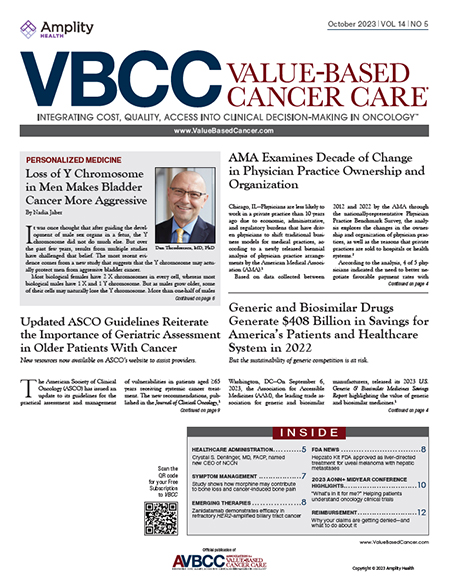The increased complexity of new oncology drugs and the accelerated rate of their approval has resulted in greater demands from stakeholders who want to ensure that patients are appropriately supported throughout their treatment. During the December 8 session of the Association for Value-Based Cancer Care (AVBCC) 10th Annual Summit, Burt Zweigenhaft, PhD, D.Litt., Co-Founder of AVBCC, led a discussion on the oncology drug supply chain.
Dan Duran, Senior Vice President and General Manager of Provider Solutions at Cardinal Health, began by saying that the transition to value-based care will have a tremendous impact on how community oncology practices operate in the future. To be successful, he said, practices will need to exercise greater control over treatment costs and patient outcomes and must have access to more sophisticated data and reporting tools.
Pete Perron, President of Provider Solutions at McKesson Specialty Health, said marketing managers are involved with the drug distribution strategy early on. As the drug moves through approvals, marketing managers are engaging with biopharma to think about pricing and reimbursements 1 to 2 years before the approval.
Lisa Harrison, RPh, President of Oncology Supply at AmerisourceBergen, said that the white-bagging method faces many barriers when it comes to managing patients on complex therapies. When patients are on both oral and infused therapies, there are complications related to the transferring of drugs to the practice and there is the potential risk for waste. Ms Harrison stated that we need to understand what best fits the patient’s need, adding that this line of thinking does not currently align with the future of value-based models.
“From a manufacturer perspective, when you think about risk, you have to ask about reward,” said Will Pih, PharmD, Executive Vice President of Specialty Commercialization at Two Labs Marketing.
Dr Pih stated value-based contracting will always have outcomes tied to it and manufacturers need to track those outcomes over time. In respect to cell and gene therapies that are often a “one and done” treatment where payment occurs over time, there needs to be another partner involved, including actuaries.
“As someone who has spent their entire career working in oncology, I have never seen a year that was more disruptive to oncology than 2020,” said Mr Duran.
Gain access to these in-depth, expert views on the future of value-based analytics in oncology practices when you register for the AVBCC Summit!


